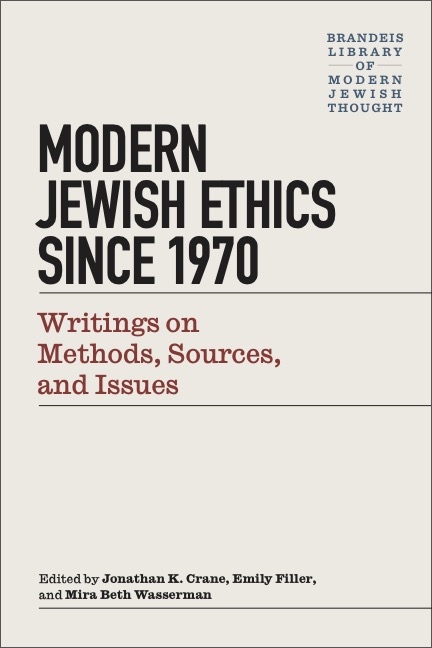Modern Jewish Ethics Since 1970: Writings on Methods, Sources, & Issues

Jonathan K. Crane, Emily Filler, and Mira Beth Wasserman, editors
The field of Jewish ethics is never far from foundational questions about how to do Jewish ethics – and these questions are inseparable from other kinds of scholarly conclusions or prescriptions. In part because Jewish ethics is inherently deliberatively, the volume is organized not by standalone essays but by small sets of curated conversations between scholars from different time periods, academic subfields, and religious commitments (or lack thereof).
These deliberate juxtapositions are to encourage scholars and students to develop similar meta-ethical analyses on Jewish ethics, broadly construed. Jewish ethics is not just a set of propositions or principles; nor can it be reduced to a single trajectory of thought or abstracted as an elaborate system of ideas. Jewish ethics is the field of study that engages Jewish texts, ideas, history, and experience in conversations about values and virtues, justice and good judgment, human relations and responsibilities. This volume presents some of those conversations to spark many more.
"An eclectic selection of writings that should be on all of our bookshelves. The editors cultivate a more nuanced moral language—rooted in the ancient but radically forward-looking - to ensure we advance a more just and compassionate society." — Rabbi Dr. Shmuly Yanklowitz, President & Dean, Valley Beit Midrash
"Scholars of Jewish ethics have been among the most innovative contemporary Jewish thinkers. New methodologies enable us to better understand the Jewish tradition and to think in new ways about Jewish life today." — Claire E. Sufrin, Senior Editor at the Shalom Hartman Institute of North America, and Editor, "Sources: A Journal of Jewish Ideas"
PURCHASE FROM BRANDEIS UNIVERSITY PRESS
About the Editors
Mira Wasserman is the Director of the Center for Jewish Ethics and Associate Professor of Rabbinic Literature at the Reconstructionist Rabbinical College. She is the author of book, Jews, Gentiles, and other Animals: The Talmud after the Humanities which was awarded the Baron Prize for the best first book in Jewish studies, and the forthcoming “‘Halakhah’ and ‘Aggadah’ and What the Talmud is Made of,” in What is the Talmud? edited by Christine Hayes and Jay Harris.Emily A. Filler is Assistant Professor in the Study of Judaism at Washington and Lee University, and Editor-in-Chief of the Journal of Jewish Ethics. Her work has been published in the Journal of Religious Ethics, Religions, Shofar, the Journal of Textual Reasoning, Studies in American Jewish Literature, and several edited volumes. She is currently completing her first monograph, a study of modern Jewish philosophy, biblical violence, and the virtues of plain sense interpretation.
Jonathan K. Crane is the Raymond F. Schinazi Scholar of Bioethics and Jewish Thought at the Ethics Center; professor of Medicine, Emory School of Medicine, and affiliated faculty in the Department of Religion, Emory College of Arts and Sciences. He is coauthor of Ahimsa: The Way to Peace, co-editor of The Oxford Handbook of Jewish Ethics and Morality, author of Narratives and Jewish Bioethics, editor of Beastly Morality: Animals as Ethical Agents, author of Eating Ethically: Religion and Science for a Better Diet, and editor of Judaism, Race, and Ethics: Conversations and Questions. He is the founder and co-editor-in-chief of the Journal of Jewish Ethics.